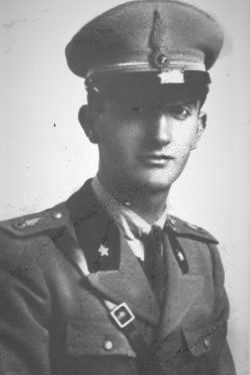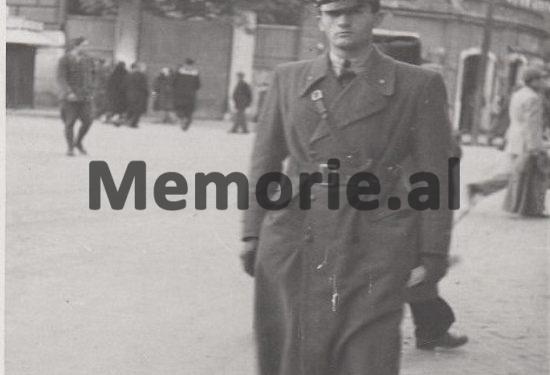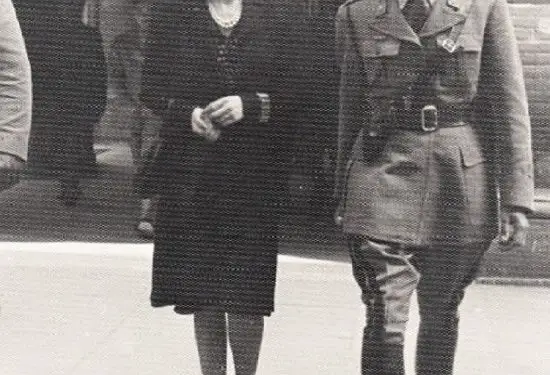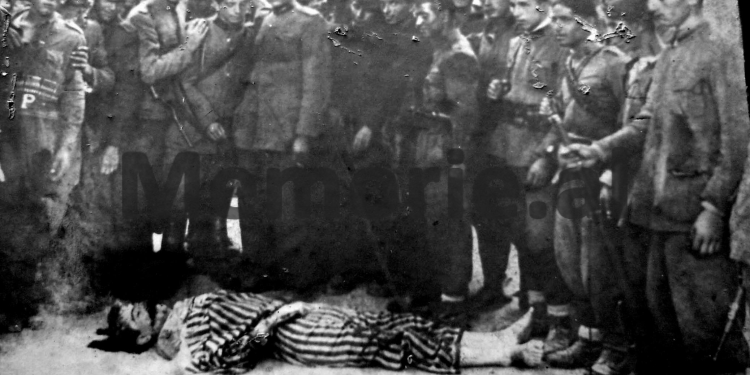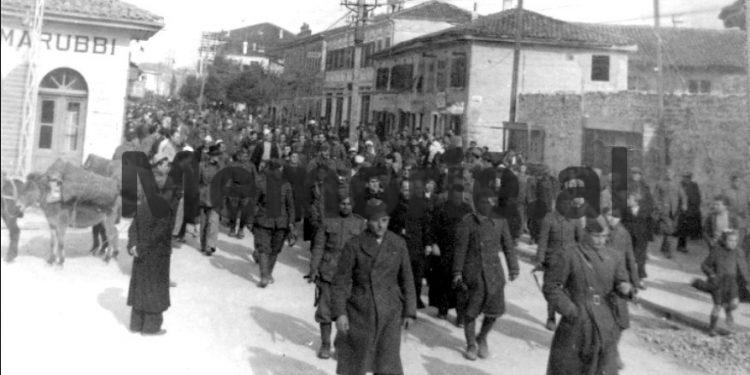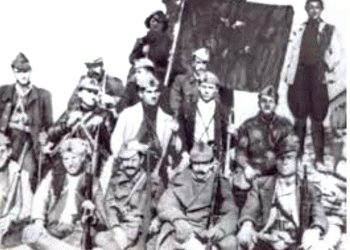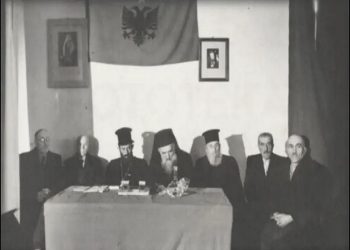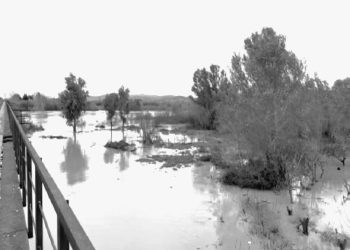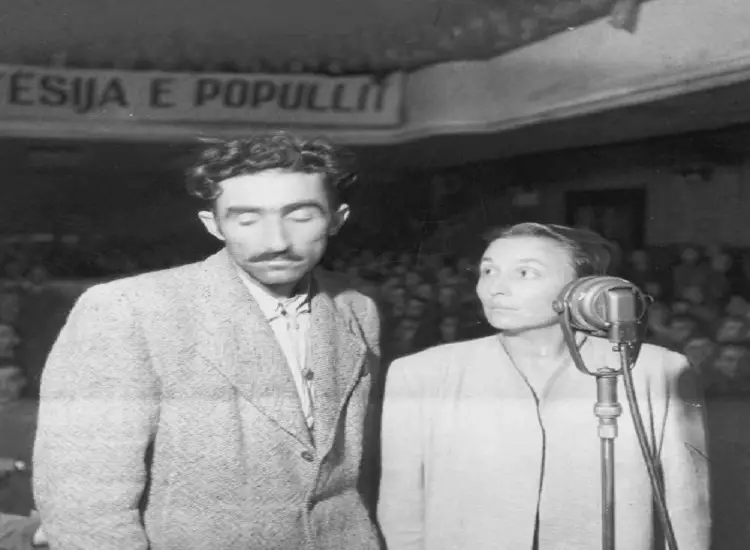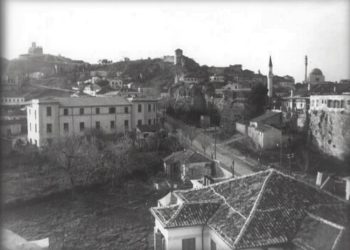By Lek Pervizi
Part seven
THE ODYSSEY OF INNOCENCE
To my brother Valentin, who faced
47 years of the ideological storms of
communism, moreover, separated
from his wife, a true Odyssey
in the middle of the twentieth century.
Memorie.al / When you enter Skuraj and cross the Urdhaza stream, the mountain ascent begins, through the hill called of Lekbibaj. You pass three mills in a row, known as those of Gjin Pjetri, which are built one after the other. You also pass the two-story tower of Ndrec Pjetri, Gjin’s younger brother, and then, you encounter a rocky outcrop on which a complex of three stone buildings is built, the historic towers known as the towers of Gjin Pjetër Pervizi of Skuraj, the leader of the Kurbin uprising. These buildings dominate the entire valley, which is formed by the union of the Mat and Fan rivers (a branch of the Mat), up to Milot. Almost a fortress, which protects and defends the area from the expeditions of foreign invading armies, which could penetrate from that gorge, until they hit the wall of the Skuraj Mountains, where the towers we mentioned were built.
In the Former Gestapo Prison in Shkodër
Naturally, when the prisoners found out the next day that he was and how he had come, with his Italian wife, they were very sorry. He had to answer the questions that the prisoners asked him, because our family was well-known, and especially my father, whom there was no one from Shkodra who did not know him, and right there in that cell, there were some who had served with him.
He had to explain the reasons that pushed him to abandon Italy and come to Albania, with all the obstacles and dangers he had faced on that journey. Pjetri had subtly nudged him to make him understand that he should weigh his words carefully, because they could be misinterpreted, since there were spies deliberately placed by the communists, ready to report.
The only good thing was that the floor was covered with planks, because it was a private house, which had been confiscated. No one was provided with blankets to spend the night, because when they were arrested, they were not allowed to take anything with them, and they were handcuffed.
The next day, Pjetri, as the person in charge of that room, convinced the guards to free another room, because they were squeezed there like sardines and could not lie down to sleep. Adjacent to that room was another one with various materials. The guards, together with the partisans and some of the prisoners, freed it and thus half of the prisoners moved there. Pjetri kept Valentin close. This improved their situation a little.
The next day, before night fell, some families had managed to get a special permit to bring clothes and blankets to the prison. Valentin also received two blankets that his wife had given to a neighbor to take to him, who had a brother in that prison. It was the fourth day of the state of siege, which was still in effect. On the fifth day, the state of siege was lifted, so on the first Sunday, a meeting was allowed and the prisoners had the opportunity to meet their people, behind the iron bars.
Gori also had the opportunity to see Valentin from a distance, behind the bars. She let him understand that someone had come, sent by his father, in the midst of the state of siege, and had brought some money and greetings from the family, from his mother, grandmother, and brothers, who were hiding in the mountains.
That man’s name was Bibë. As soon as Valentin heard the name of Bibë, he understood that it was Bib Brozi, a loyal man sent by his father, thinking that he would find them in Shkodra and perhaps take them with him to join the other members. How was such a thing possible, in the midst of the state of siege?!
We must go back to show how things stood with Valentin’s family. He had found out that his father had gone to the mountains where he was with the English and that his brothers, mother, and grandmother were sheltered with the very loyal family of Nikoll Llesh Gjoka, in the mountains of Skuraj. But events had developed in such a way that contacts had become impossible. When the family members found out about Valentin’s arrival in Shkodra with his wife, they were very upset. What had brought him there at such a dangerous time?
How to get in touch with them? They were themselves in the worst possible situation, hiding and being pursued by the partisan forces, who had orders to exterminate them. The English had left and many nationalist personalities had also fled. Valentin’s father had also taken shelter with some loyal people, in the strong mountains of Kurbin, where the partisan brigades were looking for him day and night. Regardless of these dangerous conditions, my father had called Bibë Brozi one day, entrusting him with the difficult task of going to Shkodra and meeting with Valentin, to whom he would also hand over a good amount of money.
He also gave him oral instructions for some friends and officers who had served with him. So Bib Brozi left and arrived in Shkodra where the state of siege was established. A good connoisseur of the area and skillful in his actions, he managed to enter the city at night without being noticed by anyone. There he had some friends of his, where he got information and found Valentin’s address, for which he found out that he had been arrested and imprisoned two days earlier. With great care and without being seen by anyone, he went to the dwelling and knocked on the door. Gori, completely frightened and shaken, had asked in Italian; “chi bussa, chi siete?” and Biba had replied; “amiko, amiko, venire da gjenerale.”
She had opened the door a little and Biba had repeated “venire da gjenerale Pervizi,” and Gori had let him in. At once inside, he told her (and she spoke a little Italian) that he was a loyal friend of the family, and so they understood each other. He also handed her a letter that Genci had written, where he explained all the family’s affairs. Genci had written the letter in Italian, so that Gori could also read it. So she found out all about the family’s situation and the dangers that awaited her in the future, from the communists who had taken power and had started to sow terror everywhere.
Meanwhile, Gori told Biba the whole story of the journey to Albania, and of Valentin’s arrest, and how he had narrowly escaped, because they had not found the revolver, which would have endangered him greatly. Biba was surprised at how Gori had shown herself to be a woman of courage, who had the presence of mind to hide the revolver in the wet overcoat, hanging on the wire.
He took it upon himself to take the revolver with him, to remove the burden from Gori, who was trembling with fear. The best part of this courageous action of Biba’s was that he handed her a good amount of paper napoleons, which saved Gori for a while, from the difficult and miserable situation she was in. Biba gave her courage and hope, because maybe things would get better, after the first wave of the communists’ repressive measures.
Maybe the Allies would intervene. Just as they had promised, that the situation would normalize, Biba had continued, calming the Italian woman, who was now at a dead end. That night Biba slept there, because it was too late and therefore the danger was even greater. But, before dawn, he left. Gori took a little courage from this meeting that connected her with Valentin’s family, of which she was now a part.
She also gave Biba a long letter that Valentin had written for us, where he told the whole story of their journey until they arrived in Albania. Biba managed to escape the partisan guards and return to us in the mountains, where he found us hiding with the family of Nikoll Llesh Gjoka, in a hut built specifically for us, in the forest nearby, at a time when my father also happened to be there. On the one hand we were happy that Biba had found Gori, and on the other hand we were saddened for Valentin, who had been arrested and imprisoned.
Powerless as we were, we worried more about Gori, as a young foreign woman, without protection and without the means to live, in those conditions when every day it was more and more obvious that the communists had decided to implement a policy of terror, to eliminate all the old society, which had been formed in Europe, without sparing the various urban and rural families, distinguished for their spirit of patriotism and the best Albanian traditions.
So in that meeting with Gori at the prison, Valentin was somewhat calmed down, when he found out that we had been in contact with Gori, sending her a good help for those conditions, through the great loyalist, Bib Brozi.
Prison Tragedies
Valentin, now aware that he would not be able to get rid of prison, had to adapt to that situation. In the room that was freed by half of the people, the prisoners were better settled with the few things they had, each taking up a space of four hand-spans. In this way, they could lie down to rest and sleep.
Pjetër Gurakuqi was appointed as the head of the room. Meanwhile, Valentin had made friends with a teacher from Shkodra, which was very useful to him, because in that environment, he felt completely a stranger. His name was Gjon Harusha. He had been arrested for no reason, like all the others. He did not even know why! He had worked as a teacher for more than ten years, and was considered a good man.
The prisoners had spent two weeks, waiting to know the reason for their arrest. It was a futile wait, because months and months would pass, without anyone questioning them. The machine of the dictatorship had started its cruel work. From time to time, they would take some prisoners from the cells downstairs and take them to the Kir riverbed, where they would be executed without a trial and without any questioning. The reason was known only to the torturers of the Security.
These executions were part of the cleansing program, before the special courts began to work, which would wreak legal havoc. An officer of the Security, had told a prisoner he knew in confidence, that those purges were considered necessary, to eliminate all those who were suspected of being dangerous or who had given evidence, that they were such, for whom there was no need to hold any process, or trial. Stalinist logic!
One Sunday, after the painful meeting of the prisoners with their family members, Pjetri had approached Valentin, staying close to him for some time, silent and completely shaken. He had heard bad news, which he told him about later. A friend from Berat had told the others that in Berat, the Security had called various people, to get all kinds of information about Pjetri.
- “See,” Pjetri had told him, “it won’t be long and they will take me to Berat, to judge me. He had been in Berat, as the commander of the gendarmerie during the German era, with the rank of captain. During his duty, he had tried to help the people and had gained the sympathy and trust of the citizens, saving dozens of young lives and preventing the destruction of the city by the Germans. But what’s the use?!
- “I know,” he had added, “that the people of Berat will come to my defense. But everything that is done in my favor endangers me even more. In the communist system, popularity for good is a great minus. Therefore, precisely because I have a very good opinion in Berat, I now feel like I am executed.”
Ten days did not pass, and Pjetri was taken and brought to Berat, where, as he predicted, he was executed, despite the fact that many people from Berat testified in his favor. The guillotine of the dictatorship was already cutting off people’s heads, without sparing and without mercy. From the middle of January, the prison was completely full of highlanders from the Postribë area. There, from January 9-13, a spontaneous, unorganized uprising had started by the peasantry of some villages, to attack Shkodra.
The peasants had left, most of them unarmed. The communist forces under the command of Mehmet Shehu had intervened immediately, crushing that movement right at its birth. There were houses burned, people executed, and arrested, who filled the prison cells. Even inside Shkodra, intellectuals were arrested and imprisoned, supposedly as being connected to the insurgents. Long live the pretext, to sow terror in that city.
Later, they brought some of them to the prison, who had escaped execution. Among them, a certain Osman Haxhia, who at the trial had spoken proudly about the uprising where he himself was among the leaders? But for this open and brave stand, he had been sentenced to life imprisonment. They had also brought the intellectual Sami Repishti there, sentenced to 15 years, who was then taken to the Burrel prison, together with Osman Haxhi. Thus, the Postribë uprising was extinguished, which in the meantime plunged Shkodra into terror.
Valentin was worried about Gori, who was experiencing those repressive measures, which had terrified the people of Shkodra and certainly her too. But the human is strong and overcomes difficulties and evil.
In these circumstances in Valentin’s prison, the law of the French Revolution began to be implemented. Before the day was out, the footsteps of the guards could be heard and people were seized with anxiety. The door would open, and the names of the unfortunate people who were awaiting death would be read out. The ones who were called would get up to go like sheep to the butcher. How horrible when the friend next to you heard his name and got up and got dressed quickly, and sat down and hugged his friend, whispering in his ear: – “Don’t forget us. Goodbye in the next world”!
A strange comfort. It was a true belief. To die was to escape from this miserable life, to pass into a joyful spiritual world, where you could meet your loved ones, friends, and companions. It happened to Valentin many times, that his friend next to him was taken. By now the prison had turned into a waiting room for death, for many. The names that were called passed from room to room. So it happened to Valentin to hear, people he had known there in prison.
Because the word of his arrival from Italy, at that terrible time, had spread, and the prisoners, friends and acquaintances of his father, came and met him. Mainly military officers, but also Catholic clerics, such as; Gjon Faust, Daniel Dajani, Gjon Shllaku, Ndre Zadeja, and others, who were executed. The prison was indeed an antechamber of death. From time to time in the morning, the same scene was repeated in all the rooms and cells of the prison. No one felt safe for the next day.
They even joked and made fun of whose turn it would be. Especially in his room, Prof. Guljelm Deda, whom they called Lem, who had a humorous streak. It was a humor that came from the depths of the soul, to ward off the anxiety that had gripped the prisoners. “Hey,” said Lemi, “we are living and dying like in the French Revolution. With one difference, they don’t shorten our heads. They wash them so that we can go to the other world with our heads.”
The unfortunates who were destined to be sacrificed, they were taken like animals, pushed forward with kicks and with the butts of rifles, then they would be put in handcuffs. What made the atmosphere of terror even heavier was that none of the unfortunates knew why they were being executed. It happened that someone would come and ask them out in the corridor, but no one would have the idea that with those two or three useless questions, their fate had been decided, to be erased from this world. This was the beginning of the red terror, which in Albania, would be implemented in the most brutal and macabre way, wreaking havoc on innocent Albanians.
In his room, he got to know and spend time with many people from Shkodra, among whom, Guljelm Deda and his uncle, Colonel Lin Deda. The brothers of Prek Jakova, Deda and Çesk. The Italian Father Jak Gardini, Dom Nikoll Mazrreku, the Kosovar teacher Zef Agimi, Prof. Angjelin Saraçi. Some officers, colonels, such as; Gjysh Shëldia, Luigj Mikeli, and many other military men with lower ranks. Later, Colonels Qazim Komani and Fuad Dibra. They, colleagues and friends of his father, immediately met Valentin, with kindness.1
They told him how they had returned from Kosovo to their homes in Tirana, after the end of the war2. Where it hadn’t been long and they had been arrested. They were being sent to Pristina at the request of the Yugoslavs, where execution was definitely waiting for them. The meanness of the Albanian communists had no limit. Not only these two distinguished colonels, but also other officers who had served in Kosovo, had been handed over to the Yugoslavs. Like sheep to the butcher.
Thus, Valentin, since he was held there as a hostage without being tried for two years, waited and escorted from that prison hundreds of compatriots who were executed according to a devilish plan borrowed from the French and Bolshevik revolution of Stalin.
Where at the head of this terror was a ruthless and sadistic Albanian Robespierre like Enver Hoxha with the other murderous “comrades” with whom he drafted the death lists. Valentin, in all that tragic chaos, was lucky that his name was not put on those lists. It seems he was still unknown to the band of criminals. Or he was held as a hostage for his father, Prenk Pervizi. Memorie.al




